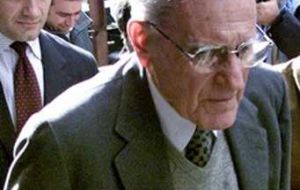MercoPress. South Atlantic News Agency
Uruguay’s former president turned dictator Bordaberry (83) dies under home arrest
 The military got rid of Bordaberry three years later after he joined the 1973 coup
The military got rid of Bordaberry three years later after he joined the 1973 coup Juan Maria Bordaberry, the elected president who turned dictator in 1973 by supporting a military coup and opening the way for twelve years of military rule, died Sunday while under house arrest.
Bordaberry, 83, was serving a 30-year prison term on charges of subverting the country's constitution and violating human rights, but given his advanced age and weak health was able to serve out his sentence at home.
The ex-dictator died around 0820 GMT Sunday of a heart ailment, said a spokesman for Senator Pedro Bordaberry, the ex-dictator's son. He was buried late Sunday afternoon.
“He has been very sick for the past two years, and was very weak for the past day,” senator Bordaberry's spokesman Jose Maria Goycochea told the daily El Pais.
Only close relatives of the former dictator and his nine children were allowed into the wake, which was held at his son's house.
The late dictator will not be buried with state honours after the populist catch-all coalition in power, headed by President Jose Mujica -- a former top leader of the guerrillas Tupamaros National Liberation Movement -- banned such honours for dictatorship-era leaders.
Deeply conservative and a devout Roman Catholic, Bordaberry was born in Montevideo in 1928. He was became active in politics in the 1950s, was elected senator 1963-1965, and served as agriculture minister 1969-1971, when he ran for president and won by a minimum margin.
With Marxist-inspired Tupamaro guerrillas engaged in a wave of attacks and the military under orders to quash unrest, Bordaberry took office in March 1972 in a highly-polarized political environment.
The following year, seeking to thwart a military uprising but lacking political support from the main opposition party led by then Senator Wilson Ferreira Aldunate, Bordaberry agreed to join the coup and close down congress. The arrangement with the military lasted until 1976, when he was replaced by another right-wing politician.
The military takeover was actually a two chapter operation: the first in February 1973 when most of the opposition led by Ferrerira Aldunate, and several of the groups which now make the ruling Broad Front collation supported the intervention believing the military were “progressive” oriented, and would a few months later call for new national elections.
However five months later June 27, the military marched in clearly showing they were power hungry and decided to reform Uruguay ending ‘cheap politics’. Democracy was finally restored in Uruguay in 1985 after a long process of political discussions forced by the failings of the military in running the country.
The heart of the deal was a matching amnesty for the armed guerrillas jailed or who had fled overseas, and non-prosecution for the police and military personnel who could have been involved in human rights violations during the dictatorship. Some extreme cases involving abduction and/or killing of children and civilians who supported the military were excluded from the benefit.
Bordaberry lived quietly in his cattle ranch until 2006, when he was arrested in a case involving four murders, including the 1976 deaths two Uruguayan legislators in neighbouring Argentina.
In March 2010 Bordaberry was rolled into a court house hooked up to an oxygen tank to hear a judge sentence him to 30 years in prison not only for the human rights cases but for having subverted his constitutional oath.
A presidential peace commission established in 2000 found that 38 people were abducted, and either were executed or died as a result of torture during the military dictatorship.
Many Uruguayan citizens however were detained and executed in Argentina, and others were detained in Chile, Paraguay, Brazil, Colombia and Bolivia during that period, the commission found.
Uruguay's military often worked with the militaries of neighbouring nations, putting into effect a secret plan called “Operation Condor” to eliminate leftist political opponents. Uruguay's last military dictator, general Gregorio Alvarez, 84, was sentenced to 25 years prison in 2009 for murder and rights violations during his 1981-1985 rule.
Events of the 1973/1985 continue to be highly controversial in Uruguay 25 years after the return of democracy. The 1986 bill granting the military amnesty from prosecution of crimes was upheld in a referendum on two occasions, 1989 and 2009, and a recent attempt in April to annul the bill, in spite of a clear majority of the ruling Broad Front coalition in Parliament was unable to muster the sufficient votes.
The vote came after Uruguay's Supreme Court ruled three times, in specific cases that the amnesty was unconstitutional. In late June president Mujica announced he would reopen some 80 investigations into alleged crimes committed during the dictatorship period.




Top Comments
Disclaimer & comment rulesCommenting for this story is now closed.
If you have a Facebook account, become a fan and comment on our Facebook Page!